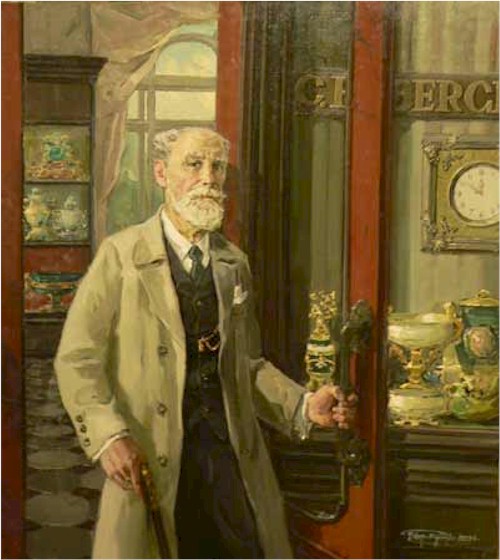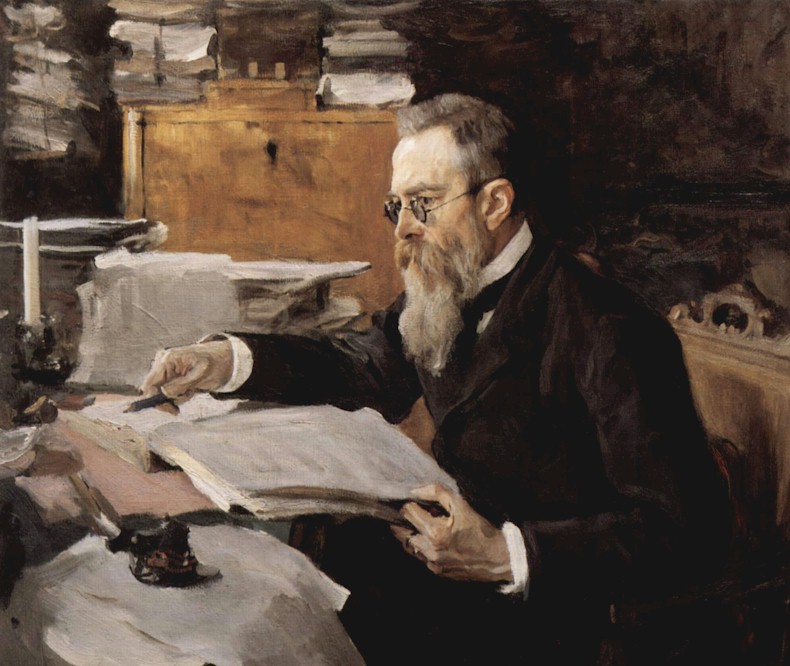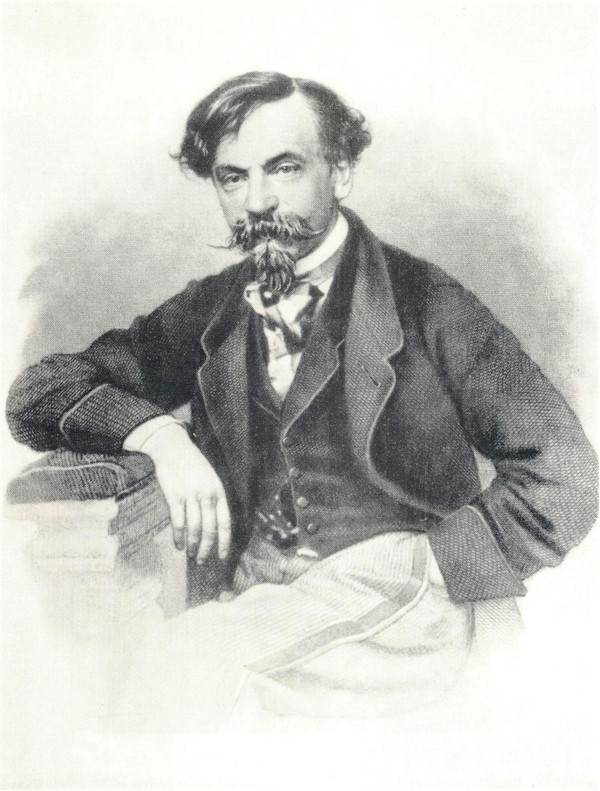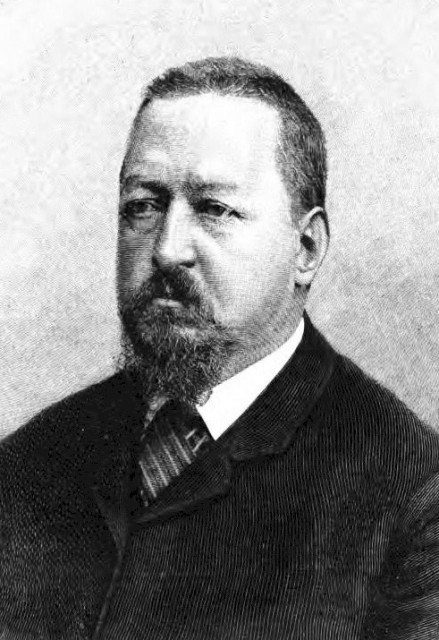Other characters in Moscow
Amvrosi and Foka
In chapter 5, Amvrosy and Foka form the duo having a converstation near the cast-iron fence of Griboedov's about the virtuoso work of Archibald Archibaldovich and the delights he serves.
Amvrosy comes from the Greek word αμβροσία [ambrosia], or immortaland it was also the name of the food of the gods conferring immortality on whoever consumed it. Foka is the name of the hero of the fable Demyan's Fish Soup by the most famous Russian fabulist Ivan Andreevich Krylov(1769-1844). Foka rejects excess, notably of foods. So it is no wonder that Amvrosi does not know what to do with his enthusiasm, while Foka thinks that «one can also dine at home».

Ivan Andreevich Krylov
Anna Frantsevna de Fougeray
Anna Frantsevna, the widow of jeweller de Fougeray, lived in apartment number 50 of Bolshaya Sadovaya ulitsa 302-bis before Likhodeev and Berlioz. The name de Fougeray must sound odd in Russian ears, because фужер [fougèré] means wine glass in Russian. In Russia lived a real jeweller with a similar name though: Peter Carl Fabergé (1846-1920).

Peter Carl Fabergé
Fabergé was a third generation Russian operating the jewelry which his father had founded in 1870 in Saint-Petersburg. He opened points of sales in Moscow, Odessa, Paris and London. His craftsmen made many lavishly decorated objects, but got famous all over the world with the imperial easter eggs which were very popular to the last two czars from 1881 to 1917.
A far relative of the real jeweler, A. P. Fabergé, lived in Prechistenka 13, where some of Bulgakov's friends lived later. Bulgakov was a frequent visitor of this house when he started living in Moscow. The candleholder and the staircase in the novel are probably based on examples he had seen there.
Prokhor Petrovich (Prosha)
Prokhor Petrovich is the chairman of the Commission on Spectacles and Entertainment of the Lighter. When Behemoth comes to see him «to discuss a little business» with him he gets irritated: «What is all this? Get him out of here, devil take me!» And - bang! Petrovich disappears, but his suit is still there and keeps on working like if nothing happened. He returned to his suit immediately after the police came into his office, to the ecstatic joy of Anna Richardovna.
The real prototype of the Commission on Spectacles and Entertainment of the Lighter which Petrovich presides is presumably the Государственного объединения музыки, эстрады и цирка (ГОМЕЦ) [Gosusarstvennogo obedineniya muzyki, estrady i tsirka] (GOMEC) or the State Union of Music-Hall, Concert, and Circus Enterprises, which was situated in the building of the Old Circus on Tsvetnoy bulvar 13, where now the Yuri Nikulin Circus is situated. For the character Prokhor Petrovich we have no prototype from real life available for the moment.
Anna Richardnova
Anna Richardovna is the secretary of Prochor Petrovich (Prosha), the chairman of the Commission on Spectacles and Entertainment of the Lighter. She calls her boss Prosha, which is rather inappropriate in a working environment.
Nikolay Ivanovich
Nikolay Ivanovich is Margarita's downstairs neighbour who rubs himself with the leftover of Azazello's cream and changes into a pig. He pals up with Margarita's maid Natasha, who flies on his back to the sabbath and to Woland's ball. He receives from Woland, very exceptionally, a certificate stating that he «spent the said night at Satan's ball, having been summoned there in the capacity of a means of transportation... make a parenthesis, Hella, in the parenthesis put 'hog'. Signed - Behemoth.». He wanted this certificate «for the purpose of presenting it to the police and to his wife».
Natalya Prokofyevna (Natasha)
Natasha is Margarita's housemaid who rubbed herself with the cream too. After the ball Woland allows her, like all of Margarita's friends, to return to the life she wishes, but she prefers to remain a witch because monsieur Jacques, one of the guests at the ball, had proposed to her.
Ivan Savelyevich Varenukha
Varenukha is the administrator of the Variety Theatre. After a rather rude meeting with Behemoth and Azazello appears in the front hall of Sadovaya 302-bis a completely naked girl - red-haired, her eyes burning with a phosphorescent gleam. «Let me give you a kiss», the girl says tenderly. Then Varenukha faints and never felt the kiss. He becomes a vampire and, together with the red Hella he terrorizes financial manager Rimsky, who was only just saved because the cock trumpeted.
Varenukha comes from варение [varenye] or to brew. It's also the name of an Ukrainean cocktail made of honey, berries and spices boiled in vodka. Unlike the Russians, who insist on chilled vodkas, the Ukrainians prefer warm brandies and vodkas, which as they so quaintly put it «make a carnation bloom right inside your stomach.» For centuries varenukha - which means boiled - was the favored tipple of the fearsome Cossacks, fueling their warrior bodies by day and making them merry by night.
Grigory Danilovich Rimsky
Rimsky is the financial manager of the Variety Theatre. But Bulgakov calls him финдиректор [findirektor] or findirector, following the good practices of the Soviet regime to use abbreviations in an official context. It's a pity that the translators did not adopt this word, because it is one of those many small parodies in the novel which give the story lines an extra pigment.
Римский or Rimsky means Roman in Russian. After his staggering meeting with Varenukha and Hella he flees from Moscow to Leningrad where he's discovered in the wardrobe of room 412 of the hotel Astoria and is delivered to Moscow under guard. The hotel Astoria at Saint-Isac square was the place where Bulgakov's usually stayed when he went to Saint-Petersburg.
The findirector's name is taken from the Russian composer Nikolay Andreevich Rimsky-Korsakov (1844-1908), who wrote the famous Flight of the Bumblebee from the opera The Tale of Tsar Saltan (1899-1900) and the symphonic suite Sherazade (1888).

Nikolay Andreevich Rimsky-Korsakov
Ironically enough the financial director of the Variety Theatre, with his rational mind an opponent of the black magic sceances, has the same name as the composer who put pagant legends and folklore onto music, like May Night (1880) and Night on Bald Mountain (1886), a symfonic poem he finished for Modest Petrovich Mussorgsky (1839-1881).
For the trivia: in Vladimir Bortko's TV-series Мастер и Маргарита [Master i Margarita] from 2005, the orchestra of the Variety Theatre plays Rimsky-Korsakov's Sherazade at the beginning of Woland's show.
Sofya Pavlovna
Pavlovna is the citizeness with the ledger at the entrance of the writers' house Griboedov who, «for unknown reasons», wrote down all those who entered the restaurant. She refuses admittance to Koroviev and Behemoth when they are having their last destructive trip in Moscow. She has the same name as the heroin from the theatre play Woe from Wit written by the real Alexander Sergeevich Griboedov (1795-1829).
When she has to admit access to the pretty pair after an intervention of Archibald Archibaldovich, they register under the names of the writers Ivan Ivanovich Panaev (1812-1862) and the critic and journalist Alexander Mikhailovich Skabichevsky (1858-1912). None of both has lived in the Soviet era, but Bulgakov considered them as low level writers. According to him they had no opinion of their own, and made their judgments just based on superficial elements like the membership of a writers' club. So they are exchangeable, which Bulgakov illustrates when they register. Koroviev wrote Skabichevsky next to the name Panaev, and Behemoth wrote Panaev next to Skabichevsky.

Ivan Ivanovich Panaev
Nevertheless Skabichevsky could sometimes lash out severely. He once wrote an article on The Adolescent by Fyodor Michailovich Dostoevski (1821-1881) and judged that Dostoevski «as an artist and novelist was very negligent and sometimes demonstrated an amazing lack of talent».

Alexander Mikhailovich Skabichevsky
Others
There are many other characters in The Master and Margarita whom we don't know much of yet. Just think of the civilian Timofei Kondratievich Kvastsov, who called the NKVD to inform them of the dollars in the toilet of Nikanor Ivanovich Bosoy, or the writer Zheldybin, Mikhail Alexandrovich's assistant in Massolit. Or the actor with a gramophone in a little suitcase that Styopa met the night before Woland came to meet with him, or the chronicler Boba Kandalupsky, famous in Moscow for his astounding omniscience. So it looks like our work will continue for a while.
English subtitles
All films based on The Master and Margarita have been subtitled by your webmaster in English, French, Dutch, German, Spanish and Italian. Click on the link belw to find them.
